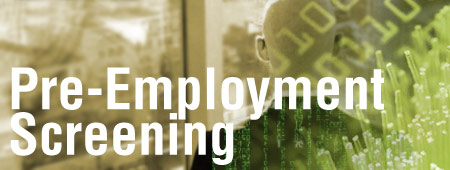 As more people create Facebook profiles (500 million and growing), and sign on to the many social media sites available today, hiring managers are finding they have new opportunities to get background information on job candidates.
As more people create Facebook profiles (500 million and growing), and sign on to the many social media sites available today, hiring managers are finding they have new opportunities to get background information on job candidates.
Tapping into a potential hire’s Facebook profile, or Twitter account, for information means you can learn more about a candidate’s personality than you might get with just a job interview. A Facebook profile, or collection of tweets, can offer additional insight into whether or not a person might be a good fit with a corporation’s culture. On the flip side, a thorough check of one’s social media footprint might also uncover some serious missteps, or questionable judgments, a potential hire has made in their past. Having the benefit of finding this BEFORE a hire has been made may make some organizations feel thankful they’ve dodged the bullet of a potential disastrous addition to the work ranks.
[See also: Checking job candidates’ FB pages can come back to haunt you]
But in between the good and the bad information is plenty of data that is illegal to view if you are making a hiring decision. And even if a hiring manager honestly does not use off-limits material, once they have seen it on Facebook, it can become grounds for a lawsuit.
“It not about the medium,” according to Victoria Mavis, president & senior consultant at Core People Resources, a human-resource-services firm in Lewisburg, Pennsylvania.”It’s about what you do with the information you get. Whether I get it off the background information check or off of Facebook, is it information I should have access to in the first place?”
For a little guidance on navigating the new landscape of information out there on potential hires, we spoke with human resource and labor law experts on ways to be smart when using Facebook and other social media to check up on job candidates.
Tip #1: If you’re going to use Facebook to vet job applicants, make it clear, up front, in the hiring process
If you plan to take advantage of social media venues, like Facebook, to conduct background investigations, the most important first step is to have a policy, and make sure candidates are aware of it, said Mavis.
“Let candidates know you are going to do background checks so you can do it properly and get authorization,” she said.
That means disclosing all of the places you may go searching for information about a potential hire, and all of the things you may go looking for.
“Identify ahead of time the five or ten things that, if you saw them on a candidate’s profile, would concern you about them. That might be a reference to use of illegal drugs, or graphics promoting hate,” said Mavis. “Also figure out what might be some positives you would seek, such as a candidate who is active in their community, or involved in a cause, such as cancer research.”
Tip #2: But remember, once you’ve viewed it, it can put you in a legal conundrum
Using Mavis’ previous point about finding out a potential hire is involved in cancer research, brings us to a concern that goes along with discovery this kind of information. As Jon Hyman, a partner in the Labor & Employment Group at Ohio legal firm Kohrman Jackson & Krantz, notes, finding out someone is involved with a cancer-related cause also means you might discover health information you shouldn’t access as a hiring organization.
“There are a lot of EEO (Equal Employment Opportunity) issues to consider,” said Hyman. “Say you are doing a Facebook search on a potential employee, and find they have “liked” the Komen Foundation. You read through the page and find this person is a breast cancer survivor. Now the bell has rung that this person has had cancer, and you now have disability-discrimination issues, whether it’s based on the actual disability, or perceived disability. You now also have genetic-information-discrimination possibilities. And that bell can’t be un-rung. And as an employer who has to make a hiring decision, you get put in the unenviable position of having to prove a negative; of having to prove that you didnt use that information as part of the decision.”
Other obvious EEO areas you don’t want to view while looking at Facebook and other social media would include religious affiliations, race status or age.
“You would never ask on a job application what year someone graduated from college, because that could disclose how old someone is,” noted Hyman.”That is not something you want to know when making hiring decision. But if you go on Facebook, you can see what year a person graduated, and you can easily put two and two together and figure out something that is information you would never ask for otherwise.”
Tip #3: Consider a third party to do the research for you
Having an independent researcher, someone not linked to the hiring and recruiting process, look for information and report back to you may be the best way to avoid any impropriety on the part of the hiring organization, said Mavis.
“If I can access your Facebook profile, I can see your sex, your age, your race. All that is privy to me and I can’t realistically say I didn’t have access to it,” she said. “But as a researcher, I could have access to it. I just dont report it on to the hiring managers.”
An independent researcher does not always have to be someone outside the company, said Mavis. Smaller organizations that may not be able to afford to hire a third-party can recruit an employee within the company who has no influence on the hiring decision.
Whoever conducts the background check should work from a list of information the employer has predetermined that they want to find, which can be both positive and negative attributes. The researcher can then print or copy the materials they have found and bring them back to the hiring organization; omitting any information that is illegal to use in a hiring decision. This ensures hiring personnel do not have access to protected information, said Mavis.
Tip #4: Understand what you find may not be reliable or accurate
“Just because someone puts it on a blog or Twitter, doesn’t mean it’s true,” said Hyman.
While information uncovered during a background investigation using Facebook, Twitter, blogs or other online sites, may make a candidate seem like a poor fit, it’s important to follow up and let them know what you have found.
“If you decide not to hire a candidate based on something a researcher has found, present them with that information, explain why it’s a concern,” said Mavis. “There is always a chance it’s incorrect on social media. It could even be the wrong person. But the candidate deserves a chance to explain.”
Source

 Follow
Follow


 The FTC decided Social Intelligence complies with the Fair Credit Reporting Act, the same set of rules that keeps your bill-payment records on file with the consumer bureaus for seven years, according to
The FTC decided Social Intelligence complies with the Fair Credit Reporting Act, the same set of rules that keeps your bill-payment records on file with the consumer bureaus for seven years, according to 







 As more people create Facebook profiles (500 million and growing), and sign on to the many social media sites available today, hiring managers are finding they have new opportunities to get background information on job candidates.
As more people create Facebook profiles (500 million and growing), and sign on to the many social media sites available today, hiring managers are finding they have new opportunities to get background information on job candidates.